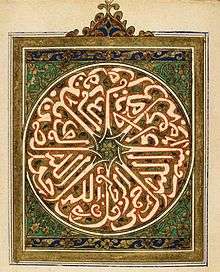Al-Ikhlas
| الإخلاص Al-Ikhlāṣ Sincerity | |
|---|---|
|
Arabic text · English translation | |
| Classification | Meccan |
| Alternate titles (Ar.) | (Sūrat al-Tawḥīd) سورة التوحيد |
| Other names | Absoluteness, The Unity, Oneness of God, Sincere Religion, The Declaration of [God's] Perfection |
| Position | Juzʼ 30 |
| No. of verses | 4 |
| Quran |
|---|
 |
|
Sūrat al-Ikhlāṣ (Arabic: سورة الإخلاص, "Fidelity" or "Sincerity"), also known as Sūrat al-Tawḥīd (Arabic: سورة التوحيد, "Monotheism") is the 112th Sura of the Qur'an. In the early years of Islam, the sūrahs of the Quran came to be known by several different names, sometimes varying by region.[1] This sūrah was among those to receive many different titles. It is a short declaration of tawhid, God's absolute oneness, consisting of 4 ayat. Al-Ikhlas means "the purity" or "the refining".
It is disputed whether this is a Meccan or Madinan sura. The former seems more probable, particularly since it seems to have been alluded to by Bilal of Abyssinia, who, when he was being tortured by his cruel master, is said to have repeated "Ahad, Ahad!" (unique, referring as here to Allah). It is reported from Ubayy ibn Ka'b that it was revealed after the polytheists asked "O Muhammad! Tell us the lineage of your Lord."
Name
Al-Ikhlas is not merely the name of this Surah but also the title of its contents, for it deals exclusively with Tauhid. The other Surahs of the Quran generally have been designated after a word occurring in them, but in this Surah the word Ikhlas has occurred nowhere. It has been given this name in view of its meaning and subject matter. Whoever understands it and believes in its teaching, will get rid of shirk (polytheism) completely.
Text and Translation
| Verse | Text | Transliteration | Translation [2] |
|---|---|---|---|
| بِسْمِ ٱللَّهِ ٱلرَّحْمَٰنِ ٱلرَّحِيم | Bismillāhi r-raḥmāni r-raḥīm | In the name of Allah , the Entirely Merciful, the Especially Merciful. | |
| 112.1. | قُلْ هُوَ ٱللَّهُ أَحَدٌ | Qul huwa-Llāhu ʾaḥad | Say, "He is Allah , [who is] One, |
| 112.2. | ٱللَّهُ ٱلصَّمَدُ | Allāhu ṣ-ṣamad | Allah , the Eternal Refuge. |
| 112.3. | لَمْ يَلِدْ وَلَمْ يُولَدْ | Lam yalid walam yūlad | He neither begets nor is born, |
| 112.4. | وَلَمْ يَكُن لَّهُۥ كُفُوًا أَحَدٌۢ | Walam yakun lahu kufuwan ʾaḥadan | Nor is there to Him any equivalent." |
Hadith

- Also see: Al-Falaq, Al-Nas, Al-Mu'awwidhatayn
According to a hadith, this sura is an especially important and honored part of the Quran:
- Narrated Abu Said Al-Khudri: A man heard another man reciting (in the prayers): 'Say (O Muhammad): "He is Allah, the One." (112.1) And he recited it repeatedly. When it was morning, he went to the Prophet and informed him about that as if he considered that the recitation of that Sura by itself was not enough. Allah's Apostle said, "By Him in Whose Hand my life is, it is equal to one-third of the Quran."[3]
- Narrated Yahya related to me from Malik from Ibn Shihab that Humayd ibn Abd ar-Rahman ibn Awf had told him that Surat al-Ikhlas (Surah 112) was equal to a third of the Qur'an, and that Surat al-Mulk (Surah 67) pleaded for its owner.[4]
- Narrated 'Aisha: The Prophet sent (an army unit) under the command of a man who used to lead his companions in the prayers and would finish his recitation with (the Sura 112): 'Say (O Muhammad): "He is Allah, the One." ' (112.1) When they returned (from the battle), they mentioned that to the Prophet. He said (to them), "Ask him why he does so." They asked him and he said, "I do so because it mentions the qualities of the Beneficent and I love to recite it (in my prayer)." The Prophet; said (to them), "Tell him that Allah loves him"[5]
- Imam Malik bin Anas has said that `Ubayd bin Hunayn heard Abu Hurayrah speaking: "I was walking with the Prophet and we heard a man reciting "Say: He, God, is One" The God's Apostle said: "It is inevitable" I asked "what?": He responded: "Paradise."
- Abu Said has narrated that he heard the Prophet saying: "Isn't every one of you able to recite one third of the Quran during a night?" They thought it was very difficult, so they asked: "Who is able to do that, O Apostle of God?" He responded: "He is God, the One and Only is one third of the Qur'an."[6]
- Al-Bukhari reported from Amrah bint Abdur-Rahman, who used to stay in the apartment of Aishah radhi'Allahu 'anha, the wife of the Prophet, that Aishah said, "The Prophet sent a man as the commander of a war expedition and he used to lead his companions in prayer with recitation (of the Quran). And he would complete his recitation with the recitation, 'say He is Allah, One'. So when they returned, they mentioned that to the Prophet and he said, "Ask him why does he do that". So they asked him and he said, "Because it is the description of Ar-Rahman and I love to recite it". So the Prophet said, "Inform him that Allah the Most High Loves him." This is how Al-Bukhari recorded this hadith in his book of tawhid. Muslim and an-Nisai also recorded it.
- An authentic Hadith says 'Say [recite] (Qul Huw allaahu Ahad) [Suraatul Ikhlaas] and al-M aw 'idhatayn ( Suratul Falaq and Suratun Naas) three times in the morning and the evening; they will suffice you from everything.' [Narrated by At-Tirmidhi. And Muhammad Nasiruddin al-Albani authenticated it: 2829[7]
- Narrated Aisha: "Whenever thy Prophet went to bed every night, he used to cup his hands together and blow over it after reciting Surah al-Ikhlas, Surah al-Falaq and Surah an-Nas, and then rub his hands over whatever parts of his body he was able to rub, starting with his head, face and front of his body. He used to do that three times.[8][9]
- Imam Ahmad also recorded that Ibn 'Umar said, "I watched the Prophet twenty-four or twenty-five times reciting in the two Rak'ahs before the Morning prayer and the two Rak'ahs after the Sunset prayer, 'Say: "O ye infidels!"' (Surah Al-Kafirun) and "Say: "He is Allah One."
See also
References
- ↑ A.T. Welch, art. ‘al-Ḳur’ān’ in Encyclopaedia of Islam, 2nd edn. On early development of sura headings see Adam Gacek, Arabic Manuscripts: A Vademecum For Readers, Handbook of Oriental Studies (Leiden/Boston: Brill, 2009), pp. 219–20.
- ↑ "Qur'an 112".
- ↑ Translation of Sahih Bukhari, Book 93: ONENESS, UNIQUENESS OF ALLAH (TAWHEED) Volume 9, Number 471
- ↑ Imam Malik's Muwatta Chapter No: 15, The Quran Hadith no: 19
- ↑ Translation of Sahih Bukhari, Book 93: ONENESS, UNIQUENESS OF ALLAH (TAWHEED) Volume 9, Number 472
- ↑ Translation of Sahih Bukhari, Book 61: Virtues of the Qur'an Book 61, Number 534
- ↑ http://abdurrahman.org/qurantafseer/TheVirtuesOfSomeSurahs_ShaikAlbanee.pdf
- ↑ (Sahih al-Bukhari Vol.6 Bk.6 No.536)
- ↑ Translation of Sahih Bukhari, Book 71: Medicine Volume 7, Number 644
External links
| Wikisource has original text related to this article: |
- Works by Abdullah Yusuf Ali at Project Gutenberg
- The Holy Qur'an, translated by Abdullah Yusuf Ali
- Three translations at Project Gutenberg
- Works by Marmaduke Pickthall at Project Gutenberg
| Previous sura: Al-Masadd |
Surah 112 | Next sura: Al-Falaq |
| Arabic text | ||
| ||